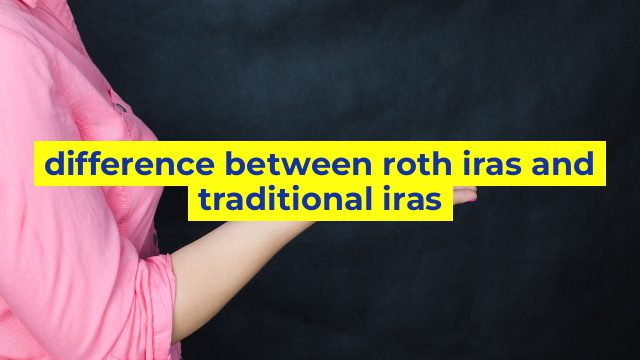Understanding the Difference between Roth IRAs and Traditional IRAs
If you’re looking for ways to save for your retirement, then you’ve likely come across two popular options – Roth IRAs and Traditional IRAs. Both types of IRAs have different advantages, disadvantages, and tax implications. Let’s take a look at the key differences between Roth IRAs and Traditional IRAs to help you decide which one is right for you.
What is a Roth IRA?
Roth IRA is a type of individual retirement account named after its chief legislative sponsor, Senator William Roth. With a Roth IRA, you contribute after-tax income to the account, and your investment grows tax-free over time. This means that when you withdraw your money during retirement, you will not have to pay any taxes on it, including earnings, provided you meet certain conditions.
What is a Traditional IRA?
A Traditional IRA is a type of individual retirement account that allows you to make pre-tax contributions. This means you can deduct the contributions from your current year’s tax bill. The money in a Traditional IRA grows tax-deferred, meaning you do not pay any taxes on investment earnings until you withdraw the money during retirement.
Differences between Roth and Traditional IRAs
There are several key differences between the two types of IRAs. The table below outlines these differences:
| | Roth IRA | Traditional IRA |
| — | — | — |
| Tax treatment | Contributions are made after-tax, and earnings and withdrawals are tax-free | Contributions are pre-tax, earnings are tax-deferred, and withdrawals are taxable |
| Income eligibility | Your modified adjusted gross income must fall below certain limits to contribute to a Roth IRA | There are no income limits to contribute to a Traditional IRA |
| Required minimum distributions | There are no required minimum distributions (RMDs) during your lifetime | You must take RMDs starting at the age of 72 |
| Early withdrawal penalties | There are no early withdrawal penalties for contributions, but early withdrawals of earnings may be subject to tax and penalty | Early withdrawals of contributions and earnings are subject to income tax and a 10% penalty |
Which one is right for you?
Choosing between a Roth IRA and a Traditional IRA may depend on factors such as your current income level, your tax bracket, your retirement goals, and your investment horizon. If you are just starting out in your career and expect to earn more in your peak earning years, a Roth IRA might be the better option since it allows you to pay taxes upfront when you are in a lower tax bracket. However, if you are currently in a high tax bracket and expect to be in a lower tax bracket during retirement, a Traditional IRA may be a better choice since it allows you to defer taxes on contributions until you withdraw the money in retirement.
Final Thoughts
Overall, the decision to invest in a Roth IRA or a Traditional IRA depends on your individual financial situation. Both types of IRAs have their own benefits and disadvantages. Consult with a financial advisor to discuss your retirement goals and create a plan that works best for you.
Table difference between roth iras and traditional iras
| Features | Roth IRA | Traditional IRA |
|---|---|---|
| Tax Treatment | Contributions are after-tax, qualified withdrawals are tax-free | Contributions may be tax-deductible, qualified withdrawals are taxed as income |
| Age Limits | No age limit for contributions or withdrawals | Contributions allowed until age 70 1/2, withdrawals required by age 72 |
| Income Limits | Contributions phase out for incomes above certain limits | Contributions may be fully deductible regardless of income |
| Withdrawal Penalties | No penalty for withdrawals of contributions at any time, penalty for withdrawals of earnings before age 59 1/2 | Penalty for withdrawals before age 59 1/2, except for specific exemptions |
| RMDs | No required minimum distributions during lifetime | Required minimum distributions starting at age 72 |
